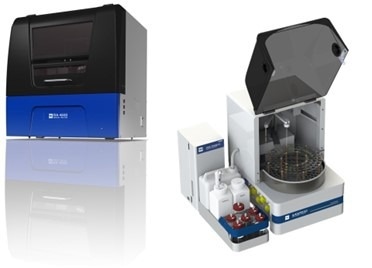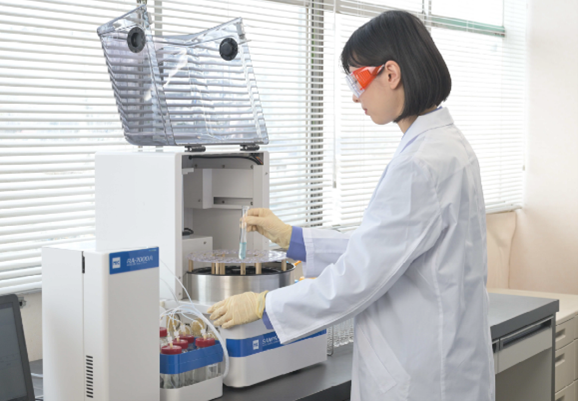Nippon Instruments Corporation (hereafter “NIC,” president: Isao Hamanaka), a subsidiary of Rigaku Holdings Corporation, has received a prestigious award for excellence at the 50th Environmental Award ceremony for their fully automated mercury measuring instrument, which is designed with consideration for environmental impact and economic efficiency.

Fully automated mercury measuring instruments - RA-4500 (left) and RA-7000 (right). Image credit: Rigaku
Mercury has been a familiar substance throughout the history of human development. While mercury is found in natural resources and minerals, its toxicity means it is regarded as a pollutant. The Minamata Convention on Mercury, which came into effect in 2017, promotes efforts to regulate emissions and releases of mercury and prevent the spread of health hazards on an international scale. NIC has focused on the importance of making it possible for “anyone to easily and accurately measure mercury,” and has been developing and providing instruments that fully automate all necessary operations.
The RA-7000, the instrument that received the “Environmental Award” this year, automates operations required for mercury measurements that include up to ten steps, thereby eliminating as much as possible the influence of operator skill and experience, as well as the measurement environment. The sensitivity of the instrument allows detection at a level 1/10th or less of the environmental standard. This enables measurements of small amounts of samples, minimizing the amount of effluent following analysis, thereby lessening environmental impact and contributing to improved economic efficiency. In terms of design, the detector, sample changer, and pre-processing unit are all integrated into a single compact enclosure. This configuration minimizes the installation space, increase workability, and improves the work environment for the comfort of operators.
When asked about receiving this esteemed award, Isao Hamanaka, CEO of NIC, said, “We are grateful to the organizers for recognizing our work in developing a unique range of mercury analysis devices. We believe that this product can help signatories of the Minumata Treaty to meet their obligations, leading to a cleaner environment around the world.”
Jun Kawakami, CEO of Rigaku Holdings, added, “Across the Rigaku group, we are putting an emphasis on providing key analytical technologies to our customers to make their products more environmentally friendly, such as these analysers for identifying mercury pollution, as well as our growing range of solutions for the electric vehicle and battery space.”
Encouraged by this award, NIC will continue to support the field of mercury measurement in Japan and abroad, especially in developing countries around the world.

Image credit: Rigaku
About the fully automated mercury measuring instrument
NIC’s line of fully automated mercury analyzers was launched in 2012. The current model, RA-7000, was released in 2023, with various updated features. Compared to the RA-4500, the new model reduces effluent from measurement by 50%, reduces electricity consumption by 30% (0.34 kg/year of CO2 equivalent emissions) and, in terms of operational efficiency, reduces measurement time by approximately 20%.
Product details
RA-4500 (previous model): https://www.hg-nic.co.jp/product/details/ra4500/index.html
RA-7000 (successor): https://www.hg-nic.co.jp/product/details/ra7/index.html
About Nippon Instruments Corporation
Address: 14-8 Akaoji-cho, Takatsuki-shi, Osaka, Japan
Established in 1978 and based in Osaka, Japan, NIC is involved in the development, manufacture, sales, and service of mercury measuring instruments. They currently export to more than 60 countries
About the Environmental Award
The Environmental Award is organized by the National Institute for Environmental Studies, Nikkan Kogyo Shimbun and supported by the Ministry of the Environment. The award wase established to raise environmental awareness by recognizing individuals, corporations, organizations, groups, etc. that have achieved or are expected to achieve results that are contributing to environmental conservation and improvement of environmental quality.